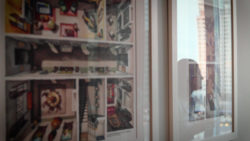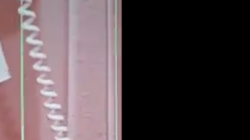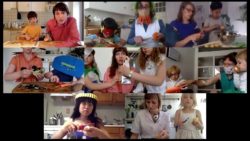Domestic Documents: Spaces of Care & Crisis
Domestic Documents: Spaces of Care & Crisis, curated and moderated by Lena Chen
Program:
Via Karelia, Elian Mikkola (Finland, 2021) 12:36
To Play With A Spinning Top, Jessica Fuquay (USA, 2021) 14:48
I Know You Have Felt What I’m Feeling Right Now, Jess Levey (USA, 2021) 07:06
Distance, Sadaf Khajeh (Canada, 2020) 08:57
Love and Labor. Intimacy and Isolation. Care and Survival., Maternal Fantasies (Berlin, 2021) 22:50
1:07:45 min
Shifting between physical and generational boundaries, the works in Domestic Documents: Spaces of Care & Crisis take the domestic as a starting point for inquiry, asking how the interactions within these spaces inform female friendships, maternal relations, and intergenerational trauma.
This program has expired. Please enjoy the recorded Q&A.
Domestic Documents Q&A
Elian Mikkola’s Via Karelia and Jessica Fuquay’s Jugar a la pirinola employ home video and archival footage to explore their grandmothers’ histories of migration while using the domestic space and all of its artifacts and activities as backdrop. In a meditative and literal journey across time and landscape, Mikkola conjures up memories of coffee and sweet dough as they confront the trauma of their grandmother’s forced resettlement following the Soviet annexation of Karelia. Meanwhile, Fuquay documents the family interactions and interior space within her grandmother’s home as a method of preservation, only to discover her grandmother’s own archive of Super 8 footage from her life in Colombia.
In the aftermath of COVID-19, the domestic sphere became a site of gendered conflict as the imbalance in unpaid care work became all the more evident. In the face of state-mandated lockdowns and daycare closures, Maternal Fantasies – an artist collective of mothers, of which I am a member – staged Love and Labor. Intimacy and Isolation. Care and Survival., a Zoom-based video performance featuring themselves and their children engaged in playful scores that draw from domestic chores and children’s games. Layered over a background of a cracked wall and a body lined with stretch marks, the chorus of 20 voices in Jess Levey’s I Know You Have Felt What I’m Feeling Right Now speak of the cumulative stress, guilt, and labor of “cooking and cleaning and teaching and mothering.”
Finally, Sadaf Khajeh’s Distance, a conversation between Iranian friends separated by distance and isolated by pandemic, utilizes the daily routines unfolding in the women’s spaces to bridge the confining impact of COVID-19 through a collaborative document of what they share in the mundane.
The queer and women filmmakers in Domestic Documents: Spaces of Care & Crisis transcend mere documentation to illustrate the solidarities and fractures residing within women’s homes – spaces in which safety, obligation, and memory intersect and unravel across time and distance.



